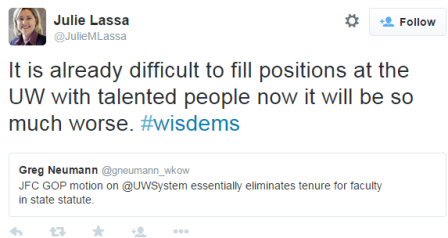You have /5 articles left.
Sign up for a free account or log in.
It’s been a tumultuous year for faculty members within the University of Wisconsin System, from threats to the Wisconsin Idea to a proposed $300 million budget cut to Governor Scott Walker’s suggestion that professors do more work to compensate for the slash.
But many professors and other observers said the roller coaster hit a new low Friday afternoon when the state Legislature's powerful Joint Finance Committee approved, by a vote of 12-4, the elimination of tenure from state statute. The committee also approved adding new limits to the faculty role in shared governance and procedures for eliminating faculty members in good standing outside of financial exigency.
Members of the committee said the changes -- proposed in a budget motion -- would give Wisconsin public institutions the flexibility needed to deal with the budget cut, which they also voted to reduce to $250 million over two years from $300 million. But others interpreted the motion as an attack on tenure and the traditionally strong system of shared governance in the state, which they said will cost the university system and Wisconsin in the long run.
If eventually passed by the full legislature, a Madison campus-based faculty advocacy organization, PROFS, said in a statement, the changes will “inflict lasting damage on a highly successful institution that was built and nurtured with major investments by Wisconsin taxpayers over a period of 167 years. …In addition to the profoundly damaging effects of the budget cut, it would be difficult to overstate how destructive and unnecessary the [finance committee’s] proposed changes to tenure and shared governance are.”
The statement continues: “Destructive because the changes will make it particularly difficult to attract and retain top faculty. Unnecessary because the changes to tenure and shared governance are not driven by any documented problem with the existing structures and procedures. On the contrary, tenure and shared governance have both been integral to the exceptional success of the [university] over many decades, both as an educational institution and as an economic engine for Wisconsin.”
Sara Goldrick-Rab, a professor of educational policy studies and sociology at Madison, said she felt as if “there’s been a death in the family.” The university’s been an “extraordinary place to work because of shared governance and tenure,” she added via email. “The ability to sift and winnow through evidence, speak truthfully, and work directly with administrators to serve students effectively -- these are the things that kept me and my colleagues here for all these years. …This is no longer a great place to work, and we are moving on.”
Goldrick-Rab said she passed up a center directorship at an institution in another state several years ago, fearing that shared governance there wasn't as strong as it was at Madison. But now she's actively pursuing opportunities elsewhere, she said. "I can’t work in an institution without genuine tenure protections and I will not work in academia without shared governance. We cannot protect students’ interests without it."
Others shared similar sentiments on Twitter during the meeting Friday. Here are a few examples:


To be clear, Friday’s meeting was just a step toward the changes becoming law. But the clout of the finance committee makes it likely the Legislature will vote to approve its recommendations. The elimination of tenure from state statute and other parts of the omnibus motion were originally proposed by the governor in his budget proposal, but Friday’s vote makes them much closer to reality. Notably, however, the committee did not endorse Walker’s proposal to make the universities part of a more autonomous public authority, effectively putting that idea to bed.
According to the motion, the fate of tenure would be up to the university system's Board of Regents, which has expressed its interest in preserving the policy. In a joint statement Friday, Ray Cross, system president, and Regina Millner, board vice president, reaffirmed that position.
“When the governor released his budget in January, the leadership of the [Wisconsin] system and the Board of Regents spoke with one voice and immediately expressed our commitment to uphold the tenets of shared governance and tenure,” they said, adding they are still committed to those principles. “We are pleased that the action proposed today by the [committee] keeps shared governance language in state statute, and we are reviewing other proposed changes related to shared governance. As tenure was not retained in statute, we will move to incorporate it into board policies immediately.”
Cross and Millner added that they were “pleased with the substantial reduction of our budget cut and the provision of additional flexibilities.”
Some faculty members have criticized the statement as cowing to the legislature and not sticking up for faculty. And even if the regents reaffirm tenure, they say, it's still weakened in losing its legal status. Some of the reaction on social media has been especially harsh on Cross, who earlier this year said he would resign if the budget cut and challenges to tenure stood. Faculty members also criticized campus chancellors, including Rebecca Blank of Madison, for not lobbying against the changes.
In a statement, Blank said the university was “heartened to see today’s statement of President Cross and Regents Vice President Millner expressing a continuing commitment to shared governance and tenure. As we have stated in the past, these principles are deeply valued by UW-Madison and we are glad to see the tenets of those principles will be upheld.”
According to the committee’s motion, tenure is stricken from state statute, along with “current law specifying that a person who has been granted tenure may be dismissed only for just cause and only after due notice and hearing.” Language limiting a “probationary appointment” to seven years also is removed.
Regarding shared governance, the committee moved to modify current law to specify that the faculty of each institution would have primary responsibility for advising the chancellor on academic and educational activities, along with faculty personnel matters “subject to the responsibilities and powers of the board, president and chancellor.” The committee moved to delete from state statute a more general definition of shared governance, that the faculty of each institution be vested with responsibility for the immediate governance of such institution and actively participate in institutional policy development.
Friday’s motion also included language saying that the faculty members in science, technology, math and engineering are “adequately represented” in the faculty organizational structure.
The motion makes it easier for the university to shed staff and faculty, including tenured faculty. Currently, Wisconsin law is in line with policy recommendations from the American Association of University Professors: faculty members may only be terminated when there is a true financial emergency (AAUP uses the term “exigency”). The committee voted to allow for the termination of faculty members “when such action is deemed necessary due to a budget or program decision regarding program discontinuance, curtailment, modification or redirection.”
The motion says that such terminations would generally follow seniority, unless program needs dictate otherwise. Faculty members would receive notice 12 months in advance, and those claiming “improper selection” would have the ability to appeal to a faculty committee that would make recommendations to the chancellor.
In reacting to the proposal, some faculty members said the lengthy dismissal proceedings seemed ominous, if not wholly inappropriate for a budgetary document.
State Representative John Nygren, co-chair of the committee, did not immediately respond to a request for comment, but said on Twitter Friday that the committee was “moving in the right direction, providing [the university] flexibilities and reducing the cut.”
But many faculty members remain dubious, if not cynical.
Chuck Rybak, associate professor of English at the Green Bay campus, wrote in his blog that the entire 15-page budget motion could be summed up in one clause: that regarding shared governance, “with regard to the responsibilities of the faculty, academic staff and students of each institution, ‘subject to’ means ‘subordinate to.’”
“This has always been about the faculty,” Rybak wrote. “The level of obsession with the faculty, with bringing talented, humble and hardworking people to heel -- the people most responsible for delivering the university’s mission -- approaches pathology.”





